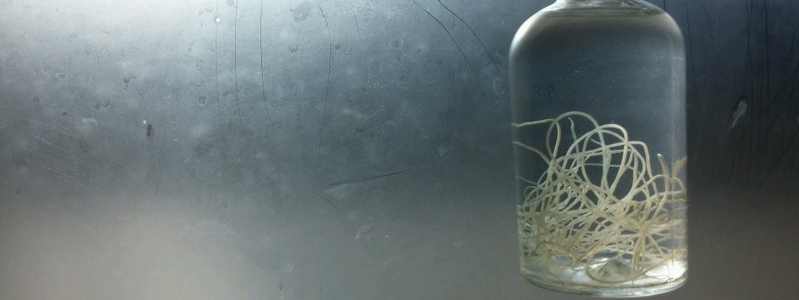April is National Heartworm awareness month celebrated every year to spread the message of prevention from this disease.
It is an opportunity to raise awareness and educate dog owners on how to firstly prevent their dogs from getting heartworms. And in how to diagnose and treat dogs, should they get heartworms.
Are Heartworms in Dogs Contagious? NO!

Heartworms in dogs are a common problem caused by “Dirofilaria immitis” It is a parasitic roundworm, also known as “dog heartworm.”
More than 70 species of mosquitoes transmit this pathogen. Some common mosquitoes are Anopheles and Aedes.
Many wild and domestic animals are susceptible to heartworms. These animals include
- Raccoons
- Dogs
- Cats
- Foxes
- Coyotes
- Sea Lions
It causes lungs disease, heart failure and causes damage to other organs of the body, ultimately leading to the death of the animal.
It is estimated that more than a million dogs in the United States have heartworms. However, the disease is commonly found in South Africa, Canada, Australia, and southern Europe. In comparison to other animals, dogs and cats are more exposed to this disease. Infection is usually seen in dogs of age 3-8 years. Rates of illness in dogs are up to 60%.
What Are The First Signs of Heartworms in Dogs?
Worms reside in the host for 5-6 months before the infection occurs. The severity of the disease depends on the number of worm infestations in the host. The more the worm load, the more severe the disease will be. The dog’s health, age, and lifestyle also matter a lot. The infected dogs are categorized into four classes from class 1 to 4.
Class-1: The dog is minimally affected with less worm burden
Class-2: Cough is the only symptom that can be seen in class 2 infected dogs
Class-3: The dogs in this class are severely affected and show the following signs:
- Cough
- Weight Loss
- Lethargy
- Exercise Intolerance
- Heart Failure
- Hemoptysis(spitting of blood through cough)
- Radiographs show anatomical changes in the heart and lungs.
Class-4: The dogs show “Caval syndrome.” In this syndrome, the worms accumulate in the right atrium (upper chamber of the heart) and ventricle (lower chamber) of the heart and lead to the closure of the tri-capsid valve.
These cause hindrance in the normal outflow of the blood and ultimately lead to heart collapse. The dogs of age 6-9 years are more susceptible to the higher burden of worms, probably because of more exposure to the worms.
How to Test a Dog For Heartworm:
The most common method of detecting heartworm in dogs is the “Antigen Detection Test.” In this test, the antibodies produced by the host’s body against the heartworm are detected. It is a highly specific and sensitive test currently available in Veterinary labs.
This test is usually used for the testing of suspected heartworm infection. Sometimes the result is negative, but it is preferred to say that the level is “below detectable limits.” The number of antibodies present in the test is directly proportional to the number of female worms present in the host.
However, there are several tests available in the market to detect low worm infestation.
The ECG of the infected dog is usually normal, and no abnormal heart wave is observed.
What Causes Heartworms in Dogs:
Mostly, mosquitos! The mosquito picks up the larvae of Dirofilaria immitis from an infected animal and then bites a healthy animal; the infected larvae are transmitted to the healthy animal.
Transmission only occurs from the bite of an infected mosquito. It does not spread contagiously like a virus or by the feces of infected animals. And you will be pleased to know that transition does not happen from direct contact with the infected animal or from “pet-to-pet.”
Treatment of Heartworms in dogs:
One of the first questions that dog owners ask upon discovering that their dog has a heartworm infection is “Can heartworm in dogs be cured?”
The treatment method depends on the condition of the dog and the number of worms present in the host’s body.
Adulticide treatment patterns are usually followed in which the injectable drug is given. The drug can kill all the adult worms, but the chances of pulmonary vascular diseases and pulmonary thrombosis increase after the Adulticide treatment, especially if pulmonary hypertension is already present.
To prevent pulmonary thrombosis after Adulticide treatment, it is now recommended by the American Heartworm Society to follow the “split-dose” or three-dose method.” In this method, the drug dose is split and is given after some interval of hours or days determined by the veterinarian.
Daily corticosteroids are given to decrease pulmonary inflammation. Cough depressants are given to make the animal stable.
Balanced fluid therapy is given in the case of a dog that isn’t feeding and drinking normally.
Surgical removal of heartworms is also an option, but it can lead to many complications, even shock, and death.
In the early stages, it is easy to treat heartworm disease. But in later stages, it is quite tricky and sometimes impossible.
Primova Pet Products: formulated to keep nasty fleas, ticks, mosquitoes
check out the other options and prices on Amazon
Prevention:
Prevention against heartworm is possible. Preventive therapy begins at the age of 6-8 weeks. Many preventive medicines are available effective against heartworms in dogs of all ages. One should not give the dose without close monitoring.
Give a proper home-cooked meal to your dog. Raw meat/food often contains the eggs of heartworm that grow in the host.
Avoid mosquito exposure to your dog; avoid the presence of stagnant water that encourages the growth of mosquitoes.
The preventive medicines can be obtained from any veterinary store and should be used according to the dosage prescribed by the certified veterinarian.
Train your dogs not to play in swamp water or stagnant water. It exposes them to a mosquito bite.
If you live in an area where mosquitos are common, then you need to be alert to the symptoms of heartworms and probably want to consider some of the preventative options such as these on Amazon:
Vet’s Best Mosquito Repellent for Dogs
Bug Soother Spray Natural Insect and Mosquito Repellent
Insect Shield Repellant Dog Bandana for Protecting Dogs
Insect Shield Insect Repellant Blanket for Protecting Dogs from Mosquitoes
Test Your Heartworm Knowledge
Click here to test your Heartworm in Dogs Knowledge – a true or false test
Related website:
Read online or download the Official guidelines from the American Heartworm Society – PDF
Recent Posts
Summer Safety Guide for Dog Owners: Keeping Your Canine Companion Cool and Comfortable
Summer brings warmth and sunshine, inviting humans and their canine companions to enjoy the outdoors. However, the rise in temperature also increases the risks of overheating and heat-related...
The Importance of Heat Safety for Dogs: Understanding Heatstroke and How to Prevent It
Heatstroke is a serious condition that can occur in dogs when their body temperature becomes dangerously high, typically as a result of prolonged exposure to high temperatures or excessive physical...

